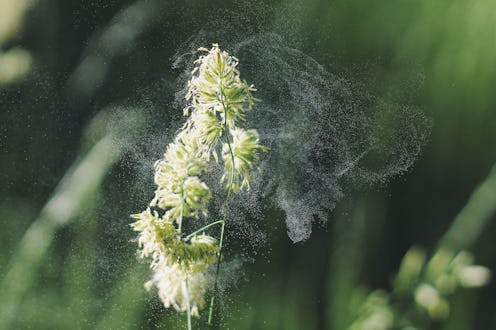Life
Allergy Season Might Get A Whole Lot Worse

Climate change is to the environment what Adam Sandler is to movies; every time you think it can't get worse, some fresh horror is produced out of nowhere. According to a report by the University of East Anglia in the U.K., the number of people with hay fever might double over the next 35 years, and it's (almost) all thanks to climate change. If you live in Europe, it might be time to start construction on a bunker filled with tissue boxes and face masks, because it's going to be a bumpy — or at least sniffly — ride.
In the report, published in Environmental Health Perspectives , researchers looked at the concentration of ragweed pollen, which is one of the most common causes of hay fever in Europe and the United States. If you're allergic, breathing in ragweed pollen causes an allergic reaction featuring cold-like symptoms, from a runny nose and watery eyes to sneezing and sinus pressure. Considering the amount of people afflicted by hay fever hovers around 40 million in the United States alone, you probably already knew that. Thankfully, seasonal allergies are, well, seasonal. Ragweed pollen levels usually peak in the summer and fall — that is, they used to. According to the University of East Anglia report, ragweed pollen concentrations are set to increase and the season itself lengthen over the next few decades, which may exacerbate the severity of symptoms.
This doesn't just predict a future filled with sneezes for places that already have large concentrations of ragweed. "Our research shows that ragweed pollen allergy will become a common health problem across Europe, expanding into areas where it is currently uncommon. ... The greatest proportional increases will happen in countries including Germany, Poland, and France," said lead researcher Dr. Iain Lake in a press release. The report concluded that the number of people affected by hay fever will jump from 33 to 77 million in Europe as soon as 2050. Lake noted that this was the "first study to quantify what the consequences of climate change on pollen allergy may be."
A report published last year came up with similar findings, suggesting that climate change and the rapid spread of ragweed throughout Europe are to blame for the increase. Although the University of East Anglia report focuses on Europe, it's not unlikely that the United States will also be affected. After all, ragweed is a North American plant in the first place. Furthermore, Lake added that "climate change consequences will not be restricted to ragweed — and a range of other pollen-producing species are likely to be affected."
But there's a silver lining: If rising levels of carbon dioxide and homeless polar bears aren't enough to convince people to meaningfully combat climate change, maybe hay fever will do the trick.
Images: Unsplash, Giphy